Unit 9 单元综合复习课件(人教版英语八年级下册Unit 9 Have you ever been to a museum?)
文档属性
| 名称 | Unit 9 单元综合复习课件(人教版英语八年级下册Unit 9 Have you ever been to a museum?) |  | |
| 格式 | pptx | ||
| 文件大小 | 24.8MB | ||
| 资源类型 | 试卷 | ||
| 版本资源 | 人教新目标(Go for it)版 | ||
| 科目 | 英语 | ||
| 更新时间 | 2024-06-03 07:12:52 | ||
图片预览

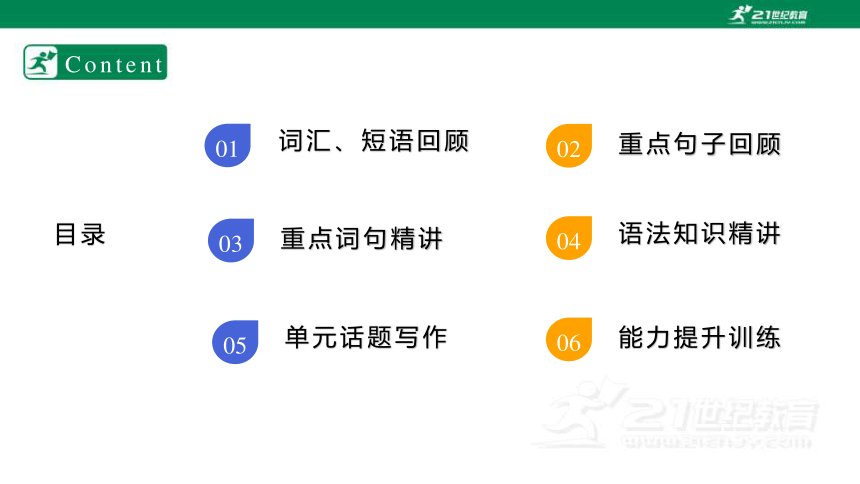
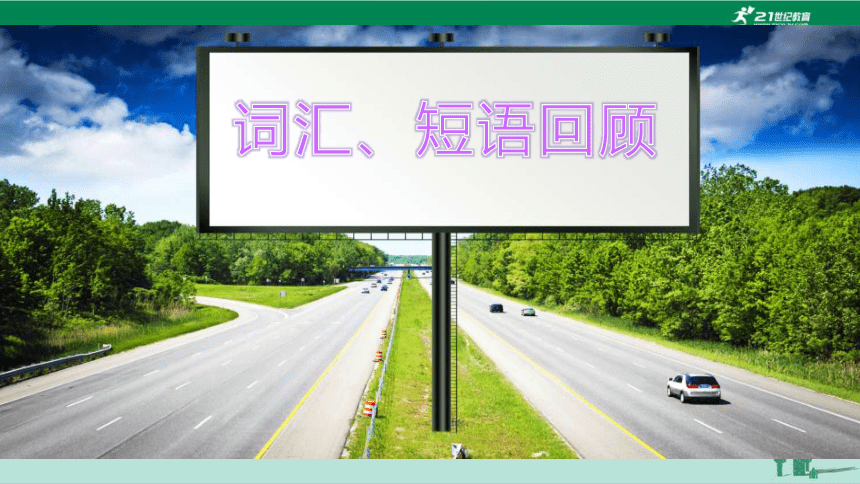
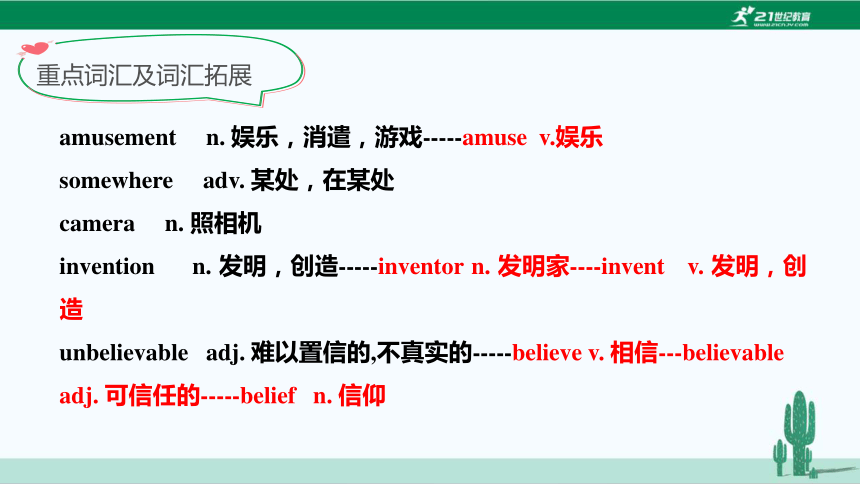
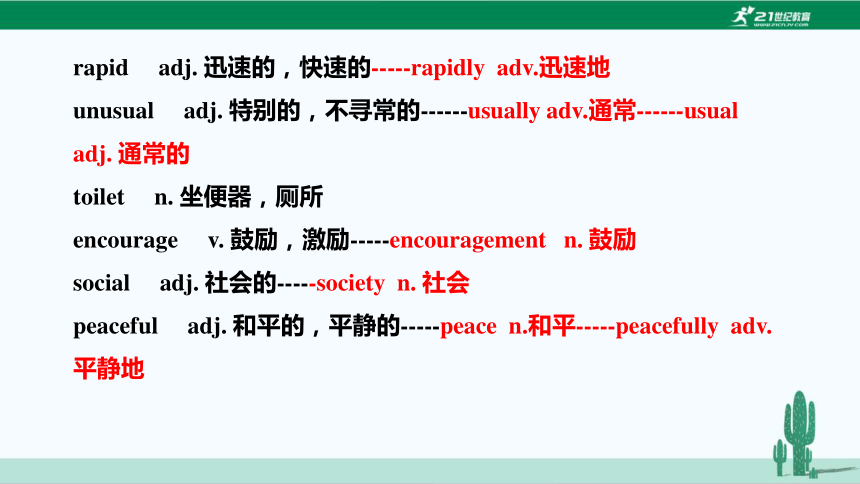
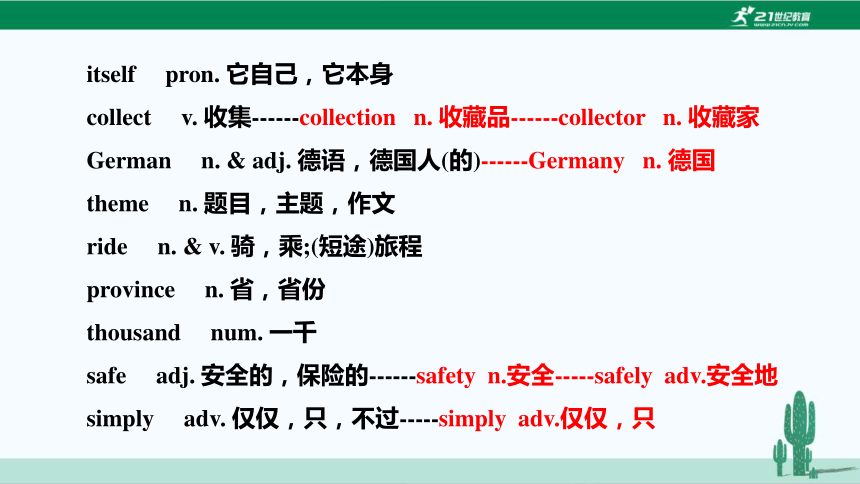
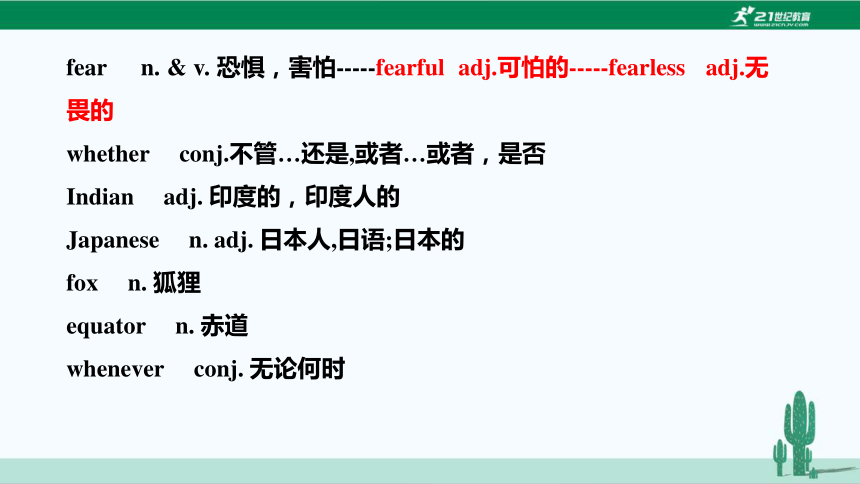
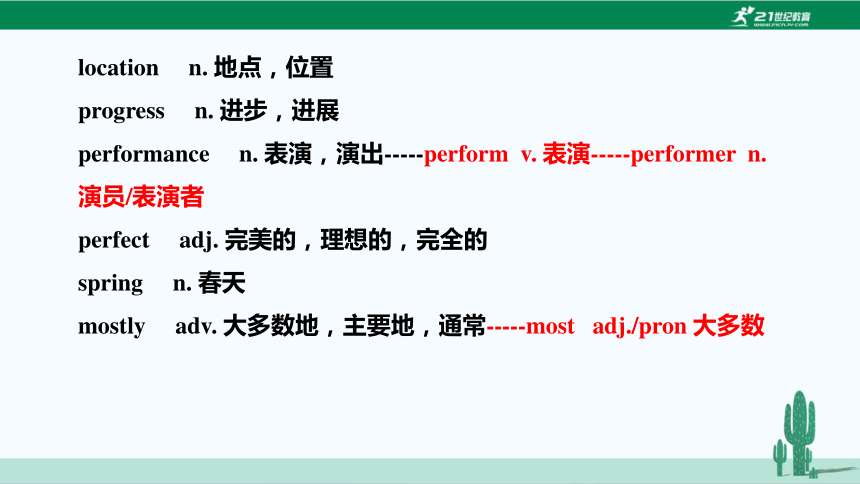
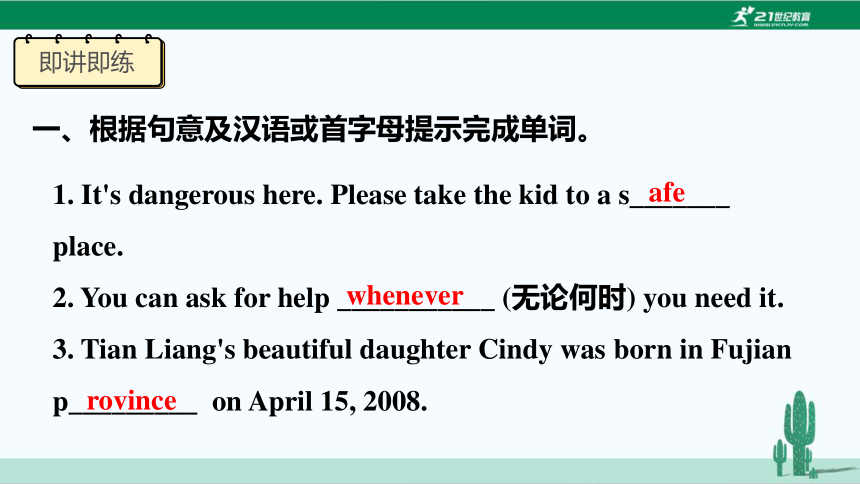
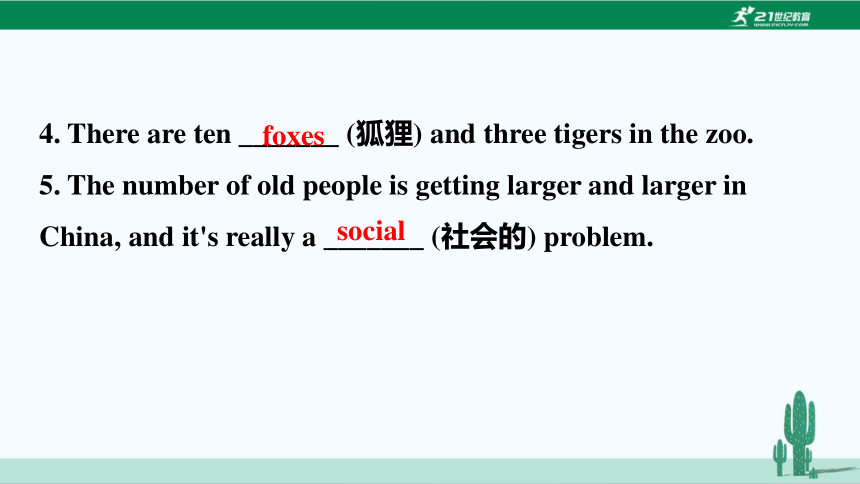
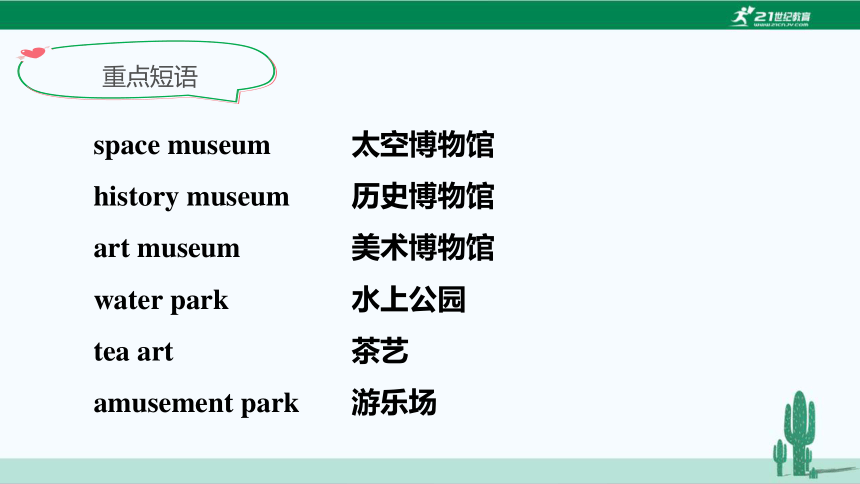
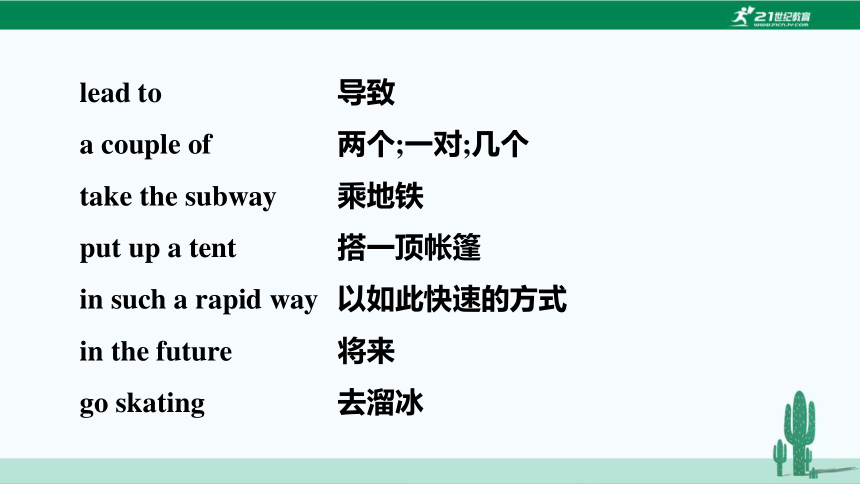
文档简介
(共63张PPT)
Unit 9 单元综合复习
人教版八年级下册
Content
词汇、短语回顾
01
重点句子回顾
02
重点词句精讲
03
语法知识精讲
04
单元话题写作
05
能力提升训练
06
目录
词汇、短语回顾
amusement n. 娱乐,消遣,游戏-----amuse v.娱乐
somewhere adv. 某处,在某处
camera n. 照相机
invention n. 发明,创造-----inventor n. 发明家----invent v. 发明,创造
unbelievable adj. 难以置信的,不真实的-----believe v. 相信---believable adj. 可信任的-----belief n. 信仰
重点词汇及词汇拓展
rapid adj. 迅速的,快速的-----rapidly adv.迅速地
unusual adj. 特别的,不寻常的------usually adv.通常------usual adj. 通常的
toilet n. 坐便器,厕所
encourage v. 鼓励,激励-----encouragement n. 鼓励
social adj. 社会的-----society n. 社会
peaceful adj. 和平的,平静的-----peace n.和平-----peacefully adv. 平静地
itself pron. 它自己,它本身
collect v. 收集------collection n. 收藏品------collector n. 收藏家
German n. & adj. 德语,德国人(的)------Germany n. 德国
theme n. 题目,主题,作文
ride n. & v. 骑,乘;(短途)旅程
province n. 省,省份
thousand num. 一千
safe adj. 安全的,保险的------safety n.安全-----safely adv.安全地
simply adv. 仅仅,只,不过-----simply adv.仅仅,只
fear n. & v. 恐惧,害怕-----fearful adj.可怕的-----fearless adj.无畏的
whether conj.不管…还是,或者…或者,是否
Indian adj. 印度的,印度人的
Japanese n. adj. 日本人,日语;日本的
fox n. 狐狸
equator n. 赤道
whenever conj. 无论何时
location n. 地点,位置
progress n. 进步,进展
performance n. 表演,演出-----perform v. 表演-----performer n.演员/表演者
perfect adj. 完美的,理想的,完全的
spring n. 春天
mostly adv. 大多数地,主要地,通常-----most adj./pron 大多数
一、根据句意及汉语或首字母提示完成单词。
即讲即练
1. It's dangerous here. Please take the kid to a s_______ place.
2. You can ask for help ___________ (无论何时) you need it.
3. Tian Liang's beautiful daughter Cindy was born in Fujian p_________ on April 15, 2008.
afe
whenever
rovince
4. There are ten _______ (狐狸) and three tigers in the zoo.
5. The number of old people is getting larger and larger in China, and it's really a _______ (社会的) problem.
foxes
social
space museum 太空博物馆
history museum 历史博物馆
art museum 美术博物馆
water park 水上公园
tea art 茶艺
amusement park 游乐场
重点短语
lead to 导致
a couple of 两个;一对;几个
take the subway 乘地铁
put up a tent 搭一顶帐篷
in such a rapid way 以如此快速的方式
in the future 将来
go skating 去溜冰
couldn’t believe my eyes 不敢相信我的眼睛
different kinds of 不同种类的
during the daytime 白天期间
all year round 全年
encourage sb.to do sth. 鼓励某人做某事
collect tea sets 收集茶具
thousands of 数以千计的;许许多多的
take a holiday 度假
on the one hand...on the other hand... 一方面……另一方面……
an English-speaking country 一个讲英语的国家
whether...or... 不管……还是……
即讲即练
1.王琳去过美国三次了。
Wang Lin _______ been _______ America three times.
2.李明以前从没有去过那儿。
Li Ming _______ never _______ there before.
一、根据汉语提示完成句子。
has to
has been
3.琳达去超市了。
Linda _______ gone _______ the supermarket.
4.杰克已经回家了吗
_____ Jack _______ home yet
5.你曾经去过国家科学博物馆吗
______ you ______ _____ _____ the National Science Museum
has to
Has gone
Have ever been to
重点句子回顾
1. Have you ever been to a science museum 你曾经去过科学博物馆吗?
2.Let's go somewhere different today. 让我们今天去不同的地方吧。
3. It's unbelievable that technology has progressed in such a rapid way.
科技以如此速猛的方式发展真是令人难以置信啊!
4. It is best to visit Singapore. 最好游览新加坡。
5. Whether you like Indian food, Western food or Japanese food, you,ll find it all in Singapore! 不管你喜欢印度食品,西方食品还是日本食品,在新加坡你都能找到!
6.One great thing about Singapore is that the temperature is almost the same all year round. 新加坡一个很大的特征是它的气温几乎一年到头都是一样的。
重点词句精讲
1. invent用法
(1)invent 作动词,意为“发明;创造”。例如:
Edison invented the light bulb. 爱迪生发明了电灯。
(2)invent还可以表示“虚构”。例如:
The whole story was invented. 整个故事是虚构的。
(3)invent的名词形式有两个,一个是inventor(发明者;发明家),另一个是invention(发明物)。例如:
Edison is a great inventor in history.爱迪生是历史上伟大的发明家。
Human history is also a history of great inventions.人类的历史也是一个伟大发明的历史。
【拓展】
invent和discover的辨析:
(1)invent 意为“发明,发明之物”指“从无到有”。例如:
Alexander Graham Bell invented the telephone in 1876.
亚历山大 格雷厄姆 贝尔在1876年发明了电话。
(2)discover 意为“发现”,指“本来就已经存在,但不为人知”的事物。
例如: Columbus discovered America in 1492.
哥伦布在1492年发现了美洲。
2. unbelievable
unbelievable作形容词,意为“难以置信的;不真实的”,是由believable“可相信的;可信任的”加否定前缀un-派生而来的。其动词形式为believe,意为“相信;以为”。例如:
It’s unbelievable that you are a writer.
我难相信你是一个作家。
【拓展】
un-是个前缀,意为“不”。例如:
happy“高兴的”— unhappy“不高兴的”;
lucky“幸运的”— unlucky“不幸的”;
important“重要的”— unimportant;“不重要的”;
healthy“健康的”— unhealthy“不健康的”。
3. encourage
encourage 作动词,意为“鼓励”。encourage sb. to do sth.意为“鼓励某人做某事”。例如:
The teacher often encourages us to study hard.
老师经常鼓励我们要努力学习。
My mother encouraged me to enter the contest.
妈妈鼓励我参加那场比赛。
【拓展】
(1)encourage sb. in sth. 意为“在……方面鼓励/助长某人”。例如:
Don’t encourage him in laziness.
别助长他的懒惰行为。
(2)encouragement是encourage的名词形式,意为“鼓舞/鼓励”。例如:
The teacher’s words were a great encouragement to him.
老师的话对他是极大的鼓舞。
4. collect
collect作及物动词,意为“收集,搜集”。
例如:collect stamps 收集邮票 collect coins 收集硬币
【拓展】
collection作名词,意为“收藏品、收集物”。collector 作名词,意为“收藏家”。例如:
These are my collections.这些是我的收藏品。
Mark is a famous stamp collector.Mark是一位著名的邮票收藏家。
5. a couple of
a couple of意为“少数;几个”。例如:
He bought a couple of books for his daughter.
他为他的女儿买了几本书。
【拓展】
a couple of还可意为“一双;一对”。例如:
I found a couple of socks in the room but they did not make a pair.
我在房间里找到两只袜子,但他们不是一双。
6. thousands of
thousand是数词,意为“千”,当表示具体的“几千”时,用“基数词 + thousand”,注意不加-s。例如:
There are six thousand students in the city. 这个城市有6000名学生。
【拓展】
(1)thousands of 表示“数千,成千上万的”这时thousand后要加-s,且后面有介词of,但是不能与数词连用。
例如:There are thousands of people on the square. 在广场上有成千上万的人。
(2)表示数词的还有hundred“百”,million“百万”,billion“十亿”。它们的用法和thousand一样,可以用来表示约数和确数。
7. whether用法
whether常引导宾语从句,表示“是否”之意。当把一般疑问句的直接引语转化成间接引语时,常用if或whether作引导词。例如:
I asked her, “Do you study English here ”
我问她:“你在这里学习英语吗?” →
I asked her if/ whether she studied English there.
我问她是否在那里学习英语。
【拓展】if和whether的辨析
if和whether均可表示“是否”,一般情况下二者可以互换。但在下列条件下,只能用whether而不能用if
(1)if后不能直接接or not。
(2)whether可作介词的宾语。
(3)whether后可接不定式。
(4)whether可用于句首。
(5)whether可引导主语从句、表语从句。例如:
Everything depends on whether we have enough money.
一切都取决于我们是否有足够的钱。
Whether it is right or wrong, I don’t know. 正确与否,我不知道。
It doesn’t matter whether he will come or not. 他来不来没关系。
8. mostly用法
mostly作副词,意为“主要地;通常 ”。例如:
He reads the occasional book, but mostly just magazines.
他偶尔也看书,但大多只看杂志。
Lizards live mostly in warm climates.
蜥蜴主要生长在气候温暖的地方。
He works mostly in London office.
他通常在伦敦办事处工作。
9. I’ve never been camping.
“have+been+现在分词”为现在完成进行时结构。表示从过去某一时刻一直延续至今的动作。在句中,说话人使用这一时态来强调自己从未有过野营的经历,欠缺这方面经验。例如:
I’ve been cleaning the house but I still haven’t finished.
我一直在打扫屋子,但我仍然没有做完。
I have been working for 12 hours.
我已经工作了12小时了。(刚结束了工作,或者还正在做并将继续)
10. I wonder how much more computers will be able to do in the future.
wonder作及物动词,意为“想知道;对……感到怀疑”,常见的用法有:
(1)后接who,what,why,where 等引导的宾语从句。
I wonder who she is. 我想知道她是谁。
She wondered what the child was doing.她感到疑惑,孩子究竟在干什么
I wonder why Ann is late. 我想知道安为什么迟到了。
I wonder where they have gone. 我想知道他们去哪儿了。
(2)后接 that 引导的宾语从句,表示“对……感到惊讶”, that常可省去。
I wonder (that) she has won the race.我对她赢了比赛感到惊讶。
(3)后接 if 或 whether 引导的宾语从句,常用来表示一种委婉的请求或疑问。
She wondered whether you were free that morning.
她想知道你那天上午是否有空。
I wonder if he will succeed.我不知道他会不会成功。
11. Let’s go to one tomorrow.
let意为“让,允许”, 表示 “让(允许)某人做某事”应该说“let sb. do sth.”,不能说“let sb. to do sth.”。例如:
Let me help you. 让我帮助你。
His mother doesn’t let him go out at night.
他母亲不让他晚上出去。
let’s…是表示建议或请求的祈使句句型,let’s是let us的缩写形式
例如:Let’s go to school. 咱们上学吧。
Let’s play basketball after school. 咱们放学后打篮球吧。
【拓展】let’s 与let us在用法上略有区别。
在表示向对方提出建议,涉及双方的共同行为时,let us可以缩写成let’s;而表示请求对方允许做某事,不涉及对方行为时,let us不能缩写成let’s。例如:
Let’s (=Let us) play sports. 咱们做运动吧。
Let us know your telephone number.请把你的电话号码告诉我们。(Let us 不能缩写成Let’s)
12. It’s really interesting, isn’t it
It’s really interesting, isn’t it 是反意疑问句,表示对陈述句所说的事实提出相反的疑问,要求对方用yes或no来进行回答。
反意疑问句由两部分组成:前一部分是陈述句,后一部分是疑问句,疑问句是由be,have,助动词或情态动词后接主语构成。
如果陈述句是肯定结构,反意疑问句须用否定结构;
反之,陈述句如果是否定结构,反意疑问句须用肯定结构。反意疑问句的两部分,必须保持人称和时态的一致。
例如:He is old, isn’t he 他老了,不是吗?
He never went there, did he 他从没有去过那里,是吗?
无论哪种形式的反意疑问句,回答时要遵循:“Yes,后接肯定式”或者“No,后接否定式”。
例如:—The girl is helping her mother with the housework, isn’t she
那个女孩正在帮妈妈做家务,不是吗?
—Yes, she is. 是的,她在帮。
—No, she isn’t. 不,她没有帮。
13. The tea art performances show how to make a perfect cup of tea with beautiful tea sets.
how to make a perfect cup of tea是“特殊疑问词+动词不定式”,在句子中作动词show的宾语。相当于特殊疑问词引导的宾语从句。例如:
I don’t know what to do =I don’t know what I can do next.
我不知道下一步做什么。
【拓展】
疑问词what,which,how,where,when等可以和动词不定式连用,构成不定式短语。“疑问词+动词不定式”可以做主语、宾语、表语等。例如:
When to start off hasn’t been decided yet. 什么时候出发还没决定。(做主语)
The question is which bus to take. 问题是乘哪辆公共汽车。(做表语)
“疑问词+动词不定式”可以由名词从句简化而来。
I don’t know what I should say. → I don’t know what to say.我不知道该说些什么。
语法知识精讲
have been to表示“(某人)曾经去过某地”,强调现在已经回了,不在那里了。
I’ve just been to the post office. 我刚才去邮局了。
Have you ever been to Hangzhou 你曾经去过杭州吗?
Mary has never been to the Great Wall. 玛丽从未去过长城。
辨析have been to , have gone to与have been in
have gone to表示“(某人)到某地去了”,强调现在还没有回,可能在那里或在途中。
They have gone to Sydney.他们去了悉尼。
— Where is Tom 汤姆在哪里?
— He has gone to the bookshop.他到书店去了。
have been in表示“(某人)在某地待了一段时间”。
How long have you been in China 你在中国多久了?
1. never “从来没有,从不”,表示否定。
e.g. He has never seen such a tall building. 他从未见过这么高的楼。
2. ever “曾经”,主要用于疑问句。
e.g. Have you ever wanted to travel around the world 你曾经想要周游世界吗?
【注意】:never, ever一般置于助动词have/has之后,过去分词之前。
现在完成时--与 ever, never 连用
单元话题写作
单元话题写作
单元写作目标
此单元的话题是 “有趣的地方”,写作任务是写一篇关于旅游或介绍旅游景点的短文。我们可以介绍自己游览过的一个地方,也可以介绍自己的家乡,或者介绍一处名胜古迹。
素材积累
开头句
1. Have you ever been to Lianyungang It’s a wonderful place to travel.
2. I have been to Lianyungang several times. I’ll never forget the experiences of visiting it.
3. If you have never been to Lianyungang, you should think of going on a
vacation there.
中间句
1. It has an area of 7, 615 square kilometers.
2. With a history of more than 2,200 years, there are many places of interest in it.
3. If you go to Lianyungang, you will have a chance to try delicious food.
4. One great thing about Lianyungang is that it has convenient transportation.
结尾句
1. If you travel to Lianyungang, I think you are sure to have a good time.
2. It is the most wonderful city I have ever been to.
3. I’m looking forward to…
范例
走进江苏,游历各地。众多外国友人暑期将参加“Go Jiangsu”旅游活动。假如你是李华,请你根据以下图片及文字提示,以“Welcome to Lianyungang”为题写一篇英语短文,邀请他们走进家乡连云港,品山海文化,游大圣故里。
注意:
1. 词数: 90左右;短文开头已给出,不计入总词数;
2. 文中应包括所给内容要点,可适当发挥,使文章连贯;
3. 文中不得出现考生的真实姓名、校名等信息。
Welcome to Lianyungang
I’m Li Hua from Lianyungang, Jiangsu. I’d like to recommend my hometown to you. ______________________________________________
______________________________________________________________
审题
1. 文体:记叙文
2. 时态:一般现在时
3. 人称:第二人称、第三人称
4. 要点提取:风景名胜、文化、风土人情、地理位置及气候特点
Welcome to Lianyungang
I’m Li Hua from Lianyungang, Jiangsu. I’d like to recommend my hometown to you.
Lianyungang lies in the north-east of Jiangsu. It’s famous for many places of interest. Here you can visit Huaguo Mountain, the home of the Monkey King. You can also go to the Suma Bay to enjoy the beautiful sea. It’s cool in summer.
Moreover, Lianyungang is a city with rich culture. Local people are friendly enough to help you, Remember to try our local food. I’m sure you will enjoy it.
Don’t miss Lianyungang when you attend “Go Jiangsu”. Welcome to our hometown. We’re looking forward to meeting you soon.
能力提升训练
一、用括号内所给单词的适当形式填空。
1.The old man had a __________(peace) life in the countryside.
2.It's sunny outside. Let’s _______(go) for a picnic in the park.
3.It seems to be the most ________ (enjoy) party I have ever had.
4.I think the computer is one of the most helpful _________(invent) in our life.
peaceful
enjoyable
inventions
go
5.Playing basketball is a great way _______ (have) fun and stay in shape.
6.— I _______(go) to the science museum yesterday. Have you ever _______(be) there?
— Yes, I have.
7.Jenny has a _______(relax) weekend with her grandparents in the countryside.
8.The monkey was looking at _____(it) in the mirror in surprise.
been
to have
went
relaxing
itself
二、单项选择
1. -Do you have a plan for the summer vacation
--Yes.Let’s go _______ this time.
A.anywhere interesting B.nowhere interesting
C.interesting somewhere D.somewhere interesting
2.The man can’t be our math teacher. He _______ to Chengdu.
A.goes B.will go C.has gone D.has been
D
C
3.I’m looking after Tom today.He’s been in my house _______ 8:00 this morning.
A.at B.since C.for D.till
4.--Beijing is very beautiful. I _______ the Palace Museum last year.
--Yes,it's very beautiful.I _______ there twice.
A.went;have gone B.went;have been
C.have gone;went D.have been;went
B
B
B
5.The teacher encouraged us _______ up a tent by ourselves when we camped in the mountains.
A.put B.to put C.putting D.puts
6.I’ve never _______ other countries.
A.traveled B.traveled to C.traveled D.will travel
7.There were many times visitors _______ photos of the building in Hongcun.
A.take B.taking C. took D.are talking
B
B
B
三、书面表达
假如你是李明,去年暑假你和你父母去了西安游玩。你的外国网友Linda对中国的古都很感兴趣,她想让你给她写一封电子邮件,介绍一下你在西安的所见所闻。请你根据提示和要求,给Linda写一封电子邮件。
要求:1. 要包括全部提示内容,可适当发挥;
2. 词数:80左右;邮件的开头和格式已给出,不计入总词数。
参考词汇:the Terracotta Army 兵马俑
the Great Wild Goose Pagoda 大雁塔 Qinling Mountains 秦岭
Xi’an meat burger 西安肉夹馍 cold noodles 凉皮
Dear Linda,
I heard that you’re really interested in my trip to Xi’an. Now let me tell you something about it.
Xi’an is a city with a long history. I went there with my parents during last summer vacation. There are lots of places of interest. We visited the Terracotta Army, the Great Wild Goose Pagoda as well as Qinling Mountains. What’s more, the food there is also delicious. We tasted a lot of food there and my favorites were Xi’an meat burger and cold noodles.
If you come to China next time, maybe I can show you around Xi’an.
Yours,
Li Ming
【参考范文】
谢谢
21世纪教育网(www.21cnjy.com)
中小学教育资源网站
兼职招聘:
https://www.21cnjy.com/recruitment/home/admin
Unit 9 单元综合复习
人教版八年级下册
Content
词汇、短语回顾
01
重点句子回顾
02
重点词句精讲
03
语法知识精讲
04
单元话题写作
05
能力提升训练
06
目录
词汇、短语回顾
amusement n. 娱乐,消遣,游戏-----amuse v.娱乐
somewhere adv. 某处,在某处
camera n. 照相机
invention n. 发明,创造-----inventor n. 发明家----invent v. 发明,创造
unbelievable adj. 难以置信的,不真实的-----believe v. 相信---believable adj. 可信任的-----belief n. 信仰
重点词汇及词汇拓展
rapid adj. 迅速的,快速的-----rapidly adv.迅速地
unusual adj. 特别的,不寻常的------usually adv.通常------usual adj. 通常的
toilet n. 坐便器,厕所
encourage v. 鼓励,激励-----encouragement n. 鼓励
social adj. 社会的-----society n. 社会
peaceful adj. 和平的,平静的-----peace n.和平-----peacefully adv. 平静地
itself pron. 它自己,它本身
collect v. 收集------collection n. 收藏品------collector n. 收藏家
German n. & adj. 德语,德国人(的)------Germany n. 德国
theme n. 题目,主题,作文
ride n. & v. 骑,乘;(短途)旅程
province n. 省,省份
thousand num. 一千
safe adj. 安全的,保险的------safety n.安全-----safely adv.安全地
simply adv. 仅仅,只,不过-----simply adv.仅仅,只
fear n. & v. 恐惧,害怕-----fearful adj.可怕的-----fearless adj.无畏的
whether conj.不管…还是,或者…或者,是否
Indian adj. 印度的,印度人的
Japanese n. adj. 日本人,日语;日本的
fox n. 狐狸
equator n. 赤道
whenever conj. 无论何时
location n. 地点,位置
progress n. 进步,进展
performance n. 表演,演出-----perform v. 表演-----performer n.演员/表演者
perfect adj. 完美的,理想的,完全的
spring n. 春天
mostly adv. 大多数地,主要地,通常-----most adj./pron 大多数
一、根据句意及汉语或首字母提示完成单词。
即讲即练
1. It's dangerous here. Please take the kid to a s_______ place.
2. You can ask for help ___________ (无论何时) you need it.
3. Tian Liang's beautiful daughter Cindy was born in Fujian p_________ on April 15, 2008.
afe
whenever
rovince
4. There are ten _______ (狐狸) and three tigers in the zoo.
5. The number of old people is getting larger and larger in China, and it's really a _______ (社会的) problem.
foxes
social
space museum 太空博物馆
history museum 历史博物馆
art museum 美术博物馆
water park 水上公园
tea art 茶艺
amusement park 游乐场
重点短语
lead to 导致
a couple of 两个;一对;几个
take the subway 乘地铁
put up a tent 搭一顶帐篷
in such a rapid way 以如此快速的方式
in the future 将来
go skating 去溜冰
couldn’t believe my eyes 不敢相信我的眼睛
different kinds of 不同种类的
during the daytime 白天期间
all year round 全年
encourage sb.to do sth. 鼓励某人做某事
collect tea sets 收集茶具
thousands of 数以千计的;许许多多的
take a holiday 度假
on the one hand...on the other hand... 一方面……另一方面……
an English-speaking country 一个讲英语的国家
whether...or... 不管……还是……
即讲即练
1.王琳去过美国三次了。
Wang Lin _______ been _______ America three times.
2.李明以前从没有去过那儿。
Li Ming _______ never _______ there before.
一、根据汉语提示完成句子。
has to
has been
3.琳达去超市了。
Linda _______ gone _______ the supermarket.
4.杰克已经回家了吗
_____ Jack _______ home yet
5.你曾经去过国家科学博物馆吗
______ you ______ _____ _____ the National Science Museum
has to
Has gone
Have ever been to
重点句子回顾
1. Have you ever been to a science museum 你曾经去过科学博物馆吗?
2.Let's go somewhere different today. 让我们今天去不同的地方吧。
3. It's unbelievable that technology has progressed in such a rapid way.
科技以如此速猛的方式发展真是令人难以置信啊!
4. It is best to visit Singapore. 最好游览新加坡。
5. Whether you like Indian food, Western food or Japanese food, you,ll find it all in Singapore! 不管你喜欢印度食品,西方食品还是日本食品,在新加坡你都能找到!
6.One great thing about Singapore is that the temperature is almost the same all year round. 新加坡一个很大的特征是它的气温几乎一年到头都是一样的。
重点词句精讲
1. invent用法
(1)invent 作动词,意为“发明;创造”。例如:
Edison invented the light bulb. 爱迪生发明了电灯。
(2)invent还可以表示“虚构”。例如:
The whole story was invented. 整个故事是虚构的。
(3)invent的名词形式有两个,一个是inventor(发明者;发明家),另一个是invention(发明物)。例如:
Edison is a great inventor in history.爱迪生是历史上伟大的发明家。
Human history is also a history of great inventions.人类的历史也是一个伟大发明的历史。
【拓展】
invent和discover的辨析:
(1)invent 意为“发明,发明之物”指“从无到有”。例如:
Alexander Graham Bell invented the telephone in 1876.
亚历山大 格雷厄姆 贝尔在1876年发明了电话。
(2)discover 意为“发现”,指“本来就已经存在,但不为人知”的事物。
例如: Columbus discovered America in 1492.
哥伦布在1492年发现了美洲。
2. unbelievable
unbelievable作形容词,意为“难以置信的;不真实的”,是由believable“可相信的;可信任的”加否定前缀un-派生而来的。其动词形式为believe,意为“相信;以为”。例如:
It’s unbelievable that you are a writer.
我难相信你是一个作家。
【拓展】
un-是个前缀,意为“不”。例如:
happy“高兴的”— unhappy“不高兴的”;
lucky“幸运的”— unlucky“不幸的”;
important“重要的”— unimportant;“不重要的”;
healthy“健康的”— unhealthy“不健康的”。
3. encourage
encourage 作动词,意为“鼓励”。encourage sb. to do sth.意为“鼓励某人做某事”。例如:
The teacher often encourages us to study hard.
老师经常鼓励我们要努力学习。
My mother encouraged me to enter the contest.
妈妈鼓励我参加那场比赛。
【拓展】
(1)encourage sb. in sth. 意为“在……方面鼓励/助长某人”。例如:
Don’t encourage him in laziness.
别助长他的懒惰行为。
(2)encouragement是encourage的名词形式,意为“鼓舞/鼓励”。例如:
The teacher’s words were a great encouragement to him.
老师的话对他是极大的鼓舞。
4. collect
collect作及物动词,意为“收集,搜集”。
例如:collect stamps 收集邮票 collect coins 收集硬币
【拓展】
collection作名词,意为“收藏品、收集物”。collector 作名词,意为“收藏家”。例如:
These are my collections.这些是我的收藏品。
Mark is a famous stamp collector.Mark是一位著名的邮票收藏家。
5. a couple of
a couple of意为“少数;几个”。例如:
He bought a couple of books for his daughter.
他为他的女儿买了几本书。
【拓展】
a couple of还可意为“一双;一对”。例如:
I found a couple of socks in the room but they did not make a pair.
我在房间里找到两只袜子,但他们不是一双。
6. thousands of
thousand是数词,意为“千”,当表示具体的“几千”时,用“基数词 + thousand”,注意不加-s。例如:
There are six thousand students in the city. 这个城市有6000名学生。
【拓展】
(1)thousands of 表示“数千,成千上万的”这时thousand后要加-s,且后面有介词of,但是不能与数词连用。
例如:There are thousands of people on the square. 在广场上有成千上万的人。
(2)表示数词的还有hundred“百”,million“百万”,billion“十亿”。它们的用法和thousand一样,可以用来表示约数和确数。
7. whether用法
whether常引导宾语从句,表示“是否”之意。当把一般疑问句的直接引语转化成间接引语时,常用if或whether作引导词。例如:
I asked her, “Do you study English here ”
我问她:“你在这里学习英语吗?” →
I asked her if/ whether she studied English there.
我问她是否在那里学习英语。
【拓展】if和whether的辨析
if和whether均可表示“是否”,一般情况下二者可以互换。但在下列条件下,只能用whether而不能用if
(1)if后不能直接接or not。
(2)whether可作介词的宾语。
(3)whether后可接不定式。
(4)whether可用于句首。
(5)whether可引导主语从句、表语从句。例如:
Everything depends on whether we have enough money.
一切都取决于我们是否有足够的钱。
Whether it is right or wrong, I don’t know. 正确与否,我不知道。
It doesn’t matter whether he will come or not. 他来不来没关系。
8. mostly用法
mostly作副词,意为“主要地;通常 ”。例如:
He reads the occasional book, but mostly just magazines.
他偶尔也看书,但大多只看杂志。
Lizards live mostly in warm climates.
蜥蜴主要生长在气候温暖的地方。
He works mostly in London office.
他通常在伦敦办事处工作。
9. I’ve never been camping.
“have+been+现在分词”为现在完成进行时结构。表示从过去某一时刻一直延续至今的动作。在句中,说话人使用这一时态来强调自己从未有过野营的经历,欠缺这方面经验。例如:
I’ve been cleaning the house but I still haven’t finished.
我一直在打扫屋子,但我仍然没有做完。
I have been working for 12 hours.
我已经工作了12小时了。(刚结束了工作,或者还正在做并将继续)
10. I wonder how much more computers will be able to do in the future.
wonder作及物动词,意为“想知道;对……感到怀疑”,常见的用法有:
(1)后接who,what,why,where 等引导的宾语从句。
I wonder who she is. 我想知道她是谁。
She wondered what the child was doing.她感到疑惑,孩子究竟在干什么
I wonder why Ann is late. 我想知道安为什么迟到了。
I wonder where they have gone. 我想知道他们去哪儿了。
(2)后接 that 引导的宾语从句,表示“对……感到惊讶”, that常可省去。
I wonder (that) she has won the race.我对她赢了比赛感到惊讶。
(3)后接 if 或 whether 引导的宾语从句,常用来表示一种委婉的请求或疑问。
She wondered whether you were free that morning.
她想知道你那天上午是否有空。
I wonder if he will succeed.我不知道他会不会成功。
11. Let’s go to one tomorrow.
let意为“让,允许”, 表示 “让(允许)某人做某事”应该说“let sb. do sth.”,不能说“let sb. to do sth.”。例如:
Let me help you. 让我帮助你。
His mother doesn’t let him go out at night.
他母亲不让他晚上出去。
let’s…是表示建议或请求的祈使句句型,let’s是let us的缩写形式
例如:Let’s go to school. 咱们上学吧。
Let’s play basketball after school. 咱们放学后打篮球吧。
【拓展】let’s 与let us在用法上略有区别。
在表示向对方提出建议,涉及双方的共同行为时,let us可以缩写成let’s;而表示请求对方允许做某事,不涉及对方行为时,let us不能缩写成let’s。例如:
Let’s (=Let us) play sports. 咱们做运动吧。
Let us know your telephone number.请把你的电话号码告诉我们。(Let us 不能缩写成Let’s)
12. It’s really interesting, isn’t it
It’s really interesting, isn’t it 是反意疑问句,表示对陈述句所说的事实提出相反的疑问,要求对方用yes或no来进行回答。
反意疑问句由两部分组成:前一部分是陈述句,后一部分是疑问句,疑问句是由be,have,助动词或情态动词后接主语构成。
如果陈述句是肯定结构,反意疑问句须用否定结构;
反之,陈述句如果是否定结构,反意疑问句须用肯定结构。反意疑问句的两部分,必须保持人称和时态的一致。
例如:He is old, isn’t he 他老了,不是吗?
He never went there, did he 他从没有去过那里,是吗?
无论哪种形式的反意疑问句,回答时要遵循:“Yes,后接肯定式”或者“No,后接否定式”。
例如:—The girl is helping her mother with the housework, isn’t she
那个女孩正在帮妈妈做家务,不是吗?
—Yes, she is. 是的,她在帮。
—No, she isn’t. 不,她没有帮。
13. The tea art performances show how to make a perfect cup of tea with beautiful tea sets.
how to make a perfect cup of tea是“特殊疑问词+动词不定式”,在句子中作动词show的宾语。相当于特殊疑问词引导的宾语从句。例如:
I don’t know what to do =I don’t know what I can do next.
我不知道下一步做什么。
【拓展】
疑问词what,which,how,where,when等可以和动词不定式连用,构成不定式短语。“疑问词+动词不定式”可以做主语、宾语、表语等。例如:
When to start off hasn’t been decided yet. 什么时候出发还没决定。(做主语)
The question is which bus to take. 问题是乘哪辆公共汽车。(做表语)
“疑问词+动词不定式”可以由名词从句简化而来。
I don’t know what I should say. → I don’t know what to say.我不知道该说些什么。
语法知识精讲
have been to表示“(某人)曾经去过某地”,强调现在已经回了,不在那里了。
I’ve just been to the post office. 我刚才去邮局了。
Have you ever been to Hangzhou 你曾经去过杭州吗?
Mary has never been to the Great Wall. 玛丽从未去过长城。
辨析have been to , have gone to与have been in
have gone to表示“(某人)到某地去了”,强调现在还没有回,可能在那里或在途中。
They have gone to Sydney.他们去了悉尼。
— Where is Tom 汤姆在哪里?
— He has gone to the bookshop.他到书店去了。
have been in表示“(某人)在某地待了一段时间”。
How long have you been in China 你在中国多久了?
1. never “从来没有,从不”,表示否定。
e.g. He has never seen such a tall building. 他从未见过这么高的楼。
2. ever “曾经”,主要用于疑问句。
e.g. Have you ever wanted to travel around the world 你曾经想要周游世界吗?
【注意】:never, ever一般置于助动词have/has之后,过去分词之前。
现在完成时--与 ever, never 连用
单元话题写作
单元话题写作
单元写作目标
此单元的话题是 “有趣的地方”,写作任务是写一篇关于旅游或介绍旅游景点的短文。我们可以介绍自己游览过的一个地方,也可以介绍自己的家乡,或者介绍一处名胜古迹。
素材积累
开头句
1. Have you ever been to Lianyungang It’s a wonderful place to travel.
2. I have been to Lianyungang several times. I’ll never forget the experiences of visiting it.
3. If you have never been to Lianyungang, you should think of going on a
vacation there.
中间句
1. It has an area of 7, 615 square kilometers.
2. With a history of more than 2,200 years, there are many places of interest in it.
3. If you go to Lianyungang, you will have a chance to try delicious food.
4. One great thing about Lianyungang is that it has convenient transportation.
结尾句
1. If you travel to Lianyungang, I think you are sure to have a good time.
2. It is the most wonderful city I have ever been to.
3. I’m looking forward to…
范例
走进江苏,游历各地。众多外国友人暑期将参加“Go Jiangsu”旅游活动。假如你是李华,请你根据以下图片及文字提示,以“Welcome to Lianyungang”为题写一篇英语短文,邀请他们走进家乡连云港,品山海文化,游大圣故里。
注意:
1. 词数: 90左右;短文开头已给出,不计入总词数;
2. 文中应包括所给内容要点,可适当发挥,使文章连贯;
3. 文中不得出现考生的真实姓名、校名等信息。
Welcome to Lianyungang
I’m Li Hua from Lianyungang, Jiangsu. I’d like to recommend my hometown to you. ______________________________________________
______________________________________________________________
审题
1. 文体:记叙文
2. 时态:一般现在时
3. 人称:第二人称、第三人称
4. 要点提取:风景名胜、文化、风土人情、地理位置及气候特点
Welcome to Lianyungang
I’m Li Hua from Lianyungang, Jiangsu. I’d like to recommend my hometown to you.
Lianyungang lies in the north-east of Jiangsu. It’s famous for many places of interest. Here you can visit Huaguo Mountain, the home of the Monkey King. You can also go to the Suma Bay to enjoy the beautiful sea. It’s cool in summer.
Moreover, Lianyungang is a city with rich culture. Local people are friendly enough to help you, Remember to try our local food. I’m sure you will enjoy it.
Don’t miss Lianyungang when you attend “Go Jiangsu”. Welcome to our hometown. We’re looking forward to meeting you soon.
能力提升训练
一、用括号内所给单词的适当形式填空。
1.The old man had a __________(peace) life in the countryside.
2.It's sunny outside. Let’s _______(go) for a picnic in the park.
3.It seems to be the most ________ (enjoy) party I have ever had.
4.I think the computer is one of the most helpful _________(invent) in our life.
peaceful
enjoyable
inventions
go
5.Playing basketball is a great way _______ (have) fun and stay in shape.
6.— I _______(go) to the science museum yesterday. Have you ever _______(be) there?
— Yes, I have.
7.Jenny has a _______(relax) weekend with her grandparents in the countryside.
8.The monkey was looking at _____(it) in the mirror in surprise.
been
to have
went
relaxing
itself
二、单项选择
1. -Do you have a plan for the summer vacation
--Yes.Let’s go _______ this time.
A.anywhere interesting B.nowhere interesting
C.interesting somewhere D.somewhere interesting
2.The man can’t be our math teacher. He _______ to Chengdu.
A.goes B.will go C.has gone D.has been
D
C
3.I’m looking after Tom today.He’s been in my house _______ 8:00 this morning.
A.at B.since C.for D.till
4.--Beijing is very beautiful. I _______ the Palace Museum last year.
--Yes,it's very beautiful.I _______ there twice.
A.went;have gone B.went;have been
C.have gone;went D.have been;went
B
B
B
5.The teacher encouraged us _______ up a tent by ourselves when we camped in the mountains.
A.put B.to put C.putting D.puts
6.I’ve never _______ other countries.
A.traveled B.traveled to C.traveled D.will travel
7.There were many times visitors _______ photos of the building in Hongcun.
A.take B.taking C. took D.are talking
B
B
B
三、书面表达
假如你是李明,去年暑假你和你父母去了西安游玩。你的外国网友Linda对中国的古都很感兴趣,她想让你给她写一封电子邮件,介绍一下你在西安的所见所闻。请你根据提示和要求,给Linda写一封电子邮件。
要求:1. 要包括全部提示内容,可适当发挥;
2. 词数:80左右;邮件的开头和格式已给出,不计入总词数。
参考词汇:the Terracotta Army 兵马俑
the Great Wild Goose Pagoda 大雁塔 Qinling Mountains 秦岭
Xi’an meat burger 西安肉夹馍 cold noodles 凉皮
Dear Linda,
I heard that you’re really interested in my trip to Xi’an. Now let me tell you something about it.
Xi’an is a city with a long history. I went there with my parents during last summer vacation. There are lots of places of interest. We visited the Terracotta Army, the Great Wild Goose Pagoda as well as Qinling Mountains. What’s more, the food there is also delicious. We tasted a lot of food there and my favorites were Xi’an meat burger and cold noodles.
If you come to China next time, maybe I can show you around Xi’an.
Yours,
Li Ming
【参考范文】
谢谢
21世纪教育网(www.21cnjy.com)
中小学教育资源网站
兼职招聘:
https://www.21cnjy.com/recruitment/home/admin
同课章节目录
- Unit 1 What's the matter?
- Section A
- Section B
- Unit 2 I'll help to clean up the city parks.
- Section A
- Section B
- Unit 3 Could you please clean your room?
- Section A
- Section B
- Unit 4 Why don't you talk to your parents?
- Section A
- Section B
- Unit 5 What were you doing when the rainstorm came
- Section A
- Section B
- Review of Units 1-5
- Unit 6 An old man tried to move the mountains.
- Section A
- Section B
- Unit 7 What's the highest mountain in the world?
- Section A
- Section B
- Unit 8 Have you read Treasure Island yet?
- Section A
- Section B
- Unit 9 Have you ever been to a museum?
- Section A
- Section B
- Unit 10 I've had this bike for three years.
- Section A
- Section B
